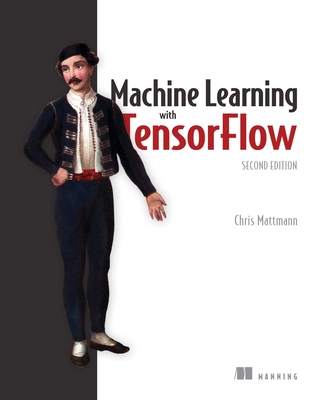Tensorflow 2.X in the Colaboratory Cloud: An Introduction to Deep Learning on Google's Cloud Service
暫譯: 在Colaboratory雲端中的TensorFlow 2.X:Google雲端服務的深度學習入門
Paper, David
- 出版商: Apress
- 出版日期: 2021-01-14
- 售價: $2,050
- 貴賓價: 9.5 折 $1,948
- 語言: 英文
- 頁數: 264
- 裝訂: Quality Paper - also called trade paper
- ISBN: 148426648X
- ISBN-13: 9781484266489
-
相關分類:
DeepLearning、TensorFlow
海外代購書籍(需單獨結帳)
商品描述
Use TensorFlow 2.x with Google's Colaboratory (Colab) product that offers a free cloud service for Python programmers. Colab is especially well suited as a platform for TensorFlow 2.x deep learning applications. You will learn Colab's default install of the most current TensorFlow 2.x along with Colab's easy access to on-demand GPU hardware acceleration in the cloud for fast execution of deep learning models. This book offers you the opportunity to grasp deep learning in an applied manner with the only requirement being an Internet connection. Everything else--Python, TensorFlow 2.x, GPU support, and Jupyter Notebooks--is provided and ready to go from Colab.
The book begins with an introduction to TensorFlow 2.x and the Google Colab cloud service. You will learn how to provision a workspace on Google Colab and build a simple neural network application. From there you will progress into TensorFlow datasets and building input pipelines in support of modeling and testing. You will find coverage of deep learning classification and regression, with clear code examples showing how to perform each of those functions. Advanced topics covered in the book include convolutional neural networks and recurrent neural networks.
This book contains all the applied math and programming you need to master the content. Examples range from simple to relatively complex when necessary to ensure acquisition of appropriate deep learning concepts and constructs. Examples are carefully explained, concise, accurate, and complete to perfectly complement deep learning skill development. Care is taken to walk you through the foundational principles of deep learning through clear examples written in Python that you can try out and experiment with using Google Colab from the comfort of your own home or office.
What You Will Learn
- Be familiar with the basic concepts and constructs of applied deep learning
- Create machine learning models with clean and reliable Python code
- Work with datasets common to deep learning applications
- Prepare data for TensorFlow consumption
- Take advantage of Google Colab's built-in support for deep learning
- Execute deep learning experiments using a variety of neural network models
- Be able to mount Google Colab directly to your Google Drive account
- Visualize training versus test performance to see model fit
Who This Book Is For
Readers who want to learn the highly popular TensorFlow 2.x deep learning platform, those who wish to master deep learning fundamentals that are sometimes skipped over in the rush to be productive, and those looking to build competency with a modern cloud service tool such as Google Colab
商品描述(中文翻譯)
使用 TensorFlow 2.x 與 Google 的 Colaboratory (Colab) 產品,該產品為 Python 程式設計師提供免費的雲端服務。Colab 特別適合作為 TensorFlow 2.x 深度學習應用的平臺。您將學習 Colab 預設安裝的最新 TensorFlow 2.x,以及 Colab 提供的隨需應變的 GPU 硬體加速,以快速執行深度學習模型。本書提供您以應用方式掌握深度學習的機會,唯一的要求是有網際網路連接。其他一切——Python、TensorFlow 2.x、GPU 支援和 Jupyter Notebooks——都由 Colab 提供並隨時可用。
本書首先介紹 TensorFlow 2.x 和 Google Colab 雲端服務。您將學習如何在 Google Colab 上配置工作區並建立一個簡單的神經網路應用。接著,您將進入 TensorFlow 數據集和建立輸入管道,以支援建模和測試。您將學習深度學習的分類和回歸,並提供清晰的程式碼範例,展示如何執行這些功能。本書涵蓋的進階主題包括卷積神經網路和遞迴神經網路。
本書包含您掌握內容所需的所有應用數學和程式設計。範例從簡單到相對複雜,必要時確保獲得適當的深度學習概念和結構。範例經過仔細解釋,簡潔、準確且完整,完美補充深度學習技能的發展。特別注意通過清晰的範例引導您了解深度學習的基本原則,這些範例使用 Python 編寫,您可以在自己舒適的家中或辦公室中使用 Google Colab 嘗試和實驗。
您將學習的內容:
- 熟悉應用深度學習的基本概念和結構
- 使用乾淨且可靠的 Python 程式碼創建機器學習模型
- 使用深度學習應用中常見的數據集
- 準備數據以供 TensorFlow 使用
- 利用 Google Colab 內建的深度學習支援
- 使用各種神經網路模型執行深度學習實驗
- 能夠將 Google Colab 直接掛載到您的 Google Drive 帳戶
- 可視化訓練與測試性能,以查看模型擬合度
本書適合的讀者:
希望學習廣受歡迎的 TensorFlow 2.x 深度學習平臺的讀者,那些希望掌握在追求生產力時有時被忽略的深度學習基本原則的讀者,以及希望與現代雲端服務工具如 Google Colab 建立能力的讀者。
作者簡介
Dr. David Paper is a full professor at Utah State University (USU) in the Management Information Systems department. He has over 30 years of higher education teaching experience. At USU, he has over 26 years teaching in the classroom and distance education over satellite. Dr. Paper has taught a variety of classes at the undergraduate, graduate, and doctorate levels, but he specializes in technology education. He has competency in several programming languages, but his focus is currently on deep learning (Python) and database programming (PyMongo). Dr. Paper has published three technical books for industry professionals, including Web Programming for Business: PHP Object-Oriented Programming with Oracle, Data Science Fundamentals for Python and MongoDB (Apress), and Hands-on Scikit-Learn for Machine Learning Applications: Data Science Fundamentals with Python (Apress). He has authored more than 100 academic publications. Besides growing up in family businesses, Dr. Paper has worked for Texas Instruments, DLS, Inc., and the Phoenix Small Business Administration. He has performed IS consulting work for IBM, AT&T, Octel, Utah Department of Transportation, and the Space Dynamics Laboratory.
作者簡介(中文翻譯)
大衛·佩珀博士是猶他州立大學(USU)管理資訊系統系的正教授。他擁有超過30年的高等教育教學經驗。在USU,他在教室和透過衛星進行遠距教育的教學經驗超過26年。佩珀博士教授過多種本科、研究生和博士級別的課程,但他專注於技術教育。他精通多種程式語言,但目前的重點是深度學習(Python)和資料庫程式設計(PyMongo)。佩珀博士為業界專業人士出版了三本技術書籍,包括商業網頁程式設計:使用Oracle的PHP物件導向程式設計、Python和MongoDB的資料科學基礎(Apress)以及機器學習應用的實作Scikit-Learn:使用Python的資料科學基礎(Apress)。他已發表超過100篇學術出版物。除了在家族企業成長外,佩珀博士曾在德州儀器、DLS, Inc.和鳳凰城小型企業管理局工作。他還為IBM、AT&T、Octel、猶他州交通部和太空動力實驗室提供資訊系統顧問服務。










